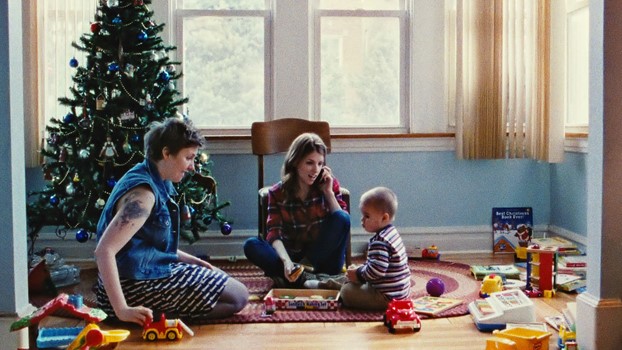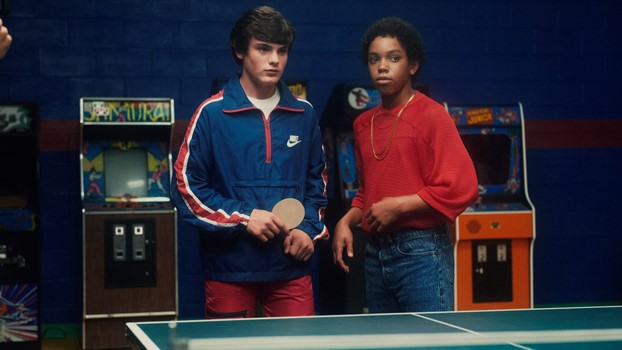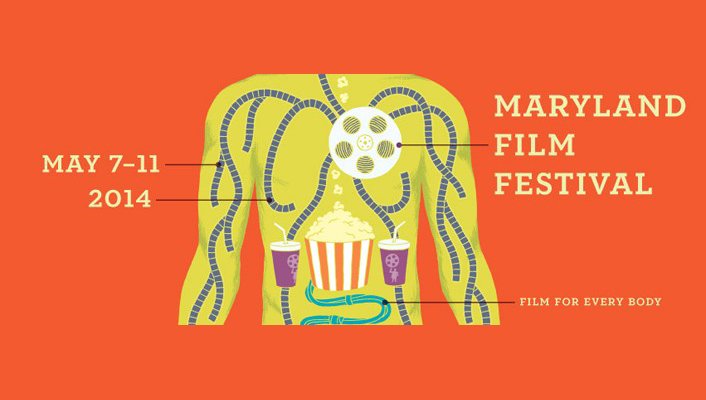House of Cards, currently one of the most popular television (um?) dramas, is shot here in Maryland. And for what it’s worth, producers seem to prefer Maryland to its Big Brother district to the south — Veep also is shot locally. But this almost was not the case — Maryland legislature and the production company behind House of Cards disagreed over tax incentives and production nearly moved elsewhere for Season 3.
For a city that has embraced its music scene so lovingly, it was distressing to see the state legislature nearly throw away the opportunity. But at least one organization in the area has shown repeated dedication to cinema. For four days each May, the Maryland Film Festival descends upon Baltimore, immersing the city in film and briefly making the city the center of international and domestic cinema. Now in its 16th year, the festival combines local flavor (features like Call Girl of Cthulhu, Ping Pong Summer) and international intrigue (films from South Korea, Russia, Nepal and Taiwan, to name a few). Like a Lena Dunham character, I’d always talked about how cool the Maryland Film Festival was, without ever actually attending. I finally changed that this year, and here’s what I saw.
Baltimore in Black and White
Dir. Emily Topper and Mary Posatko

Does the fact that three young, black men allegedly (they were acquitted at trial, but no further suspects were ever charged) killed an older white man automatically assume a racial motive? Is it even possible to discuss such a subject without bringing up race? Henry Selhorst was a father of 13, and his granddaughter Emily Topper co-directed this documentary exploring how his murder has shaped her family and their views on race. The family was raised liberal, so it’s fascinating to see them tiptoe around the race-related questions, like whether the murderers were motivated by race or if their acquittal was assisted by a prominent civil rights attorney. The doc is incredibly well written and tightly edited, even in its (apparently) unfinished state. At first I was apprehensive going into the screening, fearing the film would be too localized and unable to appeal to a larger national or international audience. But what Topper and Mary Posatko have created is a film that deftly explores the incredibly broad issue of race relations in America through the lens of an event with clear racial implications. The results are fresh and unexpected. Goddamn, it has been a good year for Baltimore docs.
Call Girl of Cthulhu
Dir. Chris LaMartina

Rejoice, O TMT faithful! What if I told you there was a movie in which noise music saves the world?? Call Girl of Cthulhu is a low-budget horror-comedy that tells the story of a struggling artist and his crush, a call girl at the center of an evil plot to resurrect the alien god Cthulhu. (But all of this was readily apparent just from reading the title, right?) The film wears its influences proudly — not only Lovecraft (whose unique brand of monsters serve the comedy aspect of the film well), but also low budget comedy-horror like Troma and Evil Dead II (tell me Dave Ramble in the role of the evil cult leader doesn’t resemble Bruce Campbell A LOT). The film was one of the more popular titles at the festival (the line for the screening I attended wrapped around the block and spilled onto the street) and not just because the film was shot locally. Director Chris LaMartina is talented and delivers exactly what you’d expect: plenty of bad jokes, fake blood, sex, and prosthetic appendages. May it please The Great Old Ones that this film reaches larger audiences, ‘cause more people should be vomiting at the theater, y’know? And for what it’s worth, James Gunn, writer and director of the sure-to-be-massive Guardians of the Galaxy, also made a movie with a giant penis monster.
Fight Church
Dir. Daniel Junge and Bryan Strokel

Cage fighting is Biblical in an Old Testament kind of way. Two men, enclosed in a confined space, use physical violence to prove dominance over one another. Fight Church is a documentary examining several ministries that offer either fight camps or integrate martial arts into their doctrines, alongside depictions of other deeply religious men with ties to mixed martial arts. Most of the subjects of the film are young pastors who find no incongruity between their love of MMA and desire to praise the Lord. The doc uses the paradoxical men as a jumping off point to explore how modern Christianity approaches notions of violence and human nature. I flirted with the idea of moral superiority going into the doc, assuming most of the subjects would sound silly, offering repeatedly contradictory statements regarding loving God and fighting. While there are several of these, most of the men are unexpectedly levelheaded, approaching MMA as a tool for their own sanity and integral to the work they do in God’s name. Only one of them comes off as truly unbalanced, revealed in a frightening scene in which he gives loaded weapons to his young children at a firing range. The film’s strength is its well-roundedness and the variety of perspectives offered; my favorite take on defeat and resilience as seen through the eyes of Pastor Paul Burress: “Jesus never tapped.”
Fort Tilden
Dir. Sarah Violet-Bliss and Charles Rogers

Fort Tilden is sort of Tiny Furniture meets Gimme the Loot, a portrait of two self-centered twenty-somethings as they make their way through Brooklyn on the way to the beach. Your enjoyment of the film will largely hinge on whether or not you think the struggling millenials (à la Girls) genre has been played out. Harper (Bridey Elliott) and Allie (Clare McNulty) spend the better part of a day trying to get to Fort Tilden, a secluded beach spot where they plan to meet up with some boys. Along the way they encounter obstacles, mostly caused by their disconnection from the real world and lack of responsibility. Most road movies (despite the lack of a car or long-distance travel, Fort Tilden is very much a road movie) are more concerned with the journey rather than the destination, often ending prior to the conclusion of the journey or without closure. But Fort Tilden lets its characters reach their El Dorado, and the scene on the beach at Fort Tilden might be the best in the entire film (it also has possibly the best use of nudity I’ve ever seen in a film, LOL). Writers-directors Sarah-Violet Bliss and Charles Rogers succeeded in a difficult task: creating in Harper and Allie two annoying, unlikeable characters that we end up caring for. Much of the credit for this is owed to Clare McNulty and Bridey Elliott, who particularly kills it in a heated exchange between her and a cab driver.
Happy Christmas
Dir. Joe Swanberg

It’s fitting I saw this film on Mother’s Day, since it, along with last year’s Drinking Buddies, seems to be a new journey for Swanberg into mom-core. The style is still organically Swanberg, but the subject matter along with the familiar emotional peaks and valleys all seem born of Better Homes and Gardens. It’s the kind of indie cinema your mom could get behind. After Jenny (Anna Kendrick) breaks up with her boyfriend, she moves in with her brother Jeff (Swanberg) and his wife Kelly (Melanie Lynskey). Jenny is a Marnie-Hannah hybrid of sexual drive and near-sighted ambition, but her youthful (or is it just immature?) energy/outlook on life revitalize the young couple’s quiet domesticity. While several of Jenny’s relationships are explored during the film, the most interesting is the one with Kelly, as Jenny wedges herself into Kelly’s industrial writing space and the two begin developing a medieval-era erotic novel. The film is infuriatingly cute at times, and 2-year old Jude Swanberg already holds a masterful grip on comedy.
Moebius
Dir. Kim Ki-duk

At least one person walked out of the screening I attended of Moebius, the newest film from South Korean director Kim Ki-duk. Like his last film Pietà (one of our favorites from last year), Moebius deals with sexuality of the Oedipal variety, and contains stark moments of intense violence. But perhaps another reason audience members fled from the screening is the film contains no dialogue, instead unfolding over a series of wordless scenes. While this may sound gimmicky (and some scenes suffer from the forced exclusion of dialogue), the process has a dream-like effect. In fact, Eun-woo Lee, in her role of mother and wife, moves through her scenes like a specter, a grounded version of the female yurei that have become synonymous with Japanese horror films. Ki-duk’s attempt to create a film without dialogue (an essential narrative tool in 2014) closely mirrors the characters’ attempts to achieve sexual climax without manual stimulation of their own genitals. The result is a challenging film, one of the best of the year.
Ping Pong Summer
Dir. Michael Tully

I have been to Ocean City, the setting of Ping Pong Summer, at least once a summer every year of my life. I slept in my vomit there during senior week. I lost a tooth at Seacrets there last year. Shit, I’ll be down there in a week for Memorial Day. Sure, it doesn’t capture the dirtiness or creepiness of the resort community, but it’s not trying to. Director Michael Tully is more interested in an idealized Ocean City, because Ping Pong Summer is about the nostalgia of the summer vacation in the 80s. But it’s also an ode to 80s movies, with classic archetypal characters, music montages, and familiar plot points. Like a teenager enduring puberty, Ping Pong Summer wants to be liked. So yes, it’s a safe film, but an entertaining one. It will play best for those on the East Coast who have visited Ocean City, but you don’t have to be a local to enjoy it.
The Vanquishing of the Witch Baba Yaga
Dir. Jessica Oreck

Combining animation with footage shot all over Eastern Europe, Jessica Oreck’s latest offering began as a film about mushroom hunting, is held together by a retelling of the Baba Yaga folktale, and covers much more. Traditional-versus-modern and civilization-versus-nature (most often in the form of the forest, threatening and unknown) are just some of the juxtapositions explored. Beautiful narration, written by Oreck but spoken in a Slavic tongue, reflects on human nature and the wilderness inside us all. The film produced in me an eerie feeling of pervasive dread, possibly because of the grim nature of the tale of Baba Yaga. The footage of fog descending over mountains and the abandoned city of Pripyat didn’t help ease that feeling. No other film at the festival left this much of an impression on me. It’s a film that’s given me quite a headache, yet I can’t stop thinking about it.
Water Like Stone
Dir. Zack Godshall

Water Like Stone is a portrait of Leeville, Louisiana — one of the last remaining wetlands in the United States, which is itself rapidly disappearing. But rather than parading a series of scientists and professors in front of the camera to shove statistics and theories down the audiences’ throat, director Zack Godshall relies on the inhabitants of the community to tell the story. The environmental aspect — the disappearing marshes — takes a backseat as the doc focuses on the community itself. While they aren’t quite the residents of Errol Morris’ Vernon, Florida, they’re still endearing and interesting enough to command your attention for 75 minutes. Godshall understands this is the path to pathos, allowing for the audience to connect emotionally with the characters populating Leeville. By juxtaposing the portraits of the people with serene shots of the wetlands and surrounding township, Godshall highlights what will be lost once the marshes are gone. And it won’t just be the wildlife; the community will be swallowed whole, and all the memories and experiences of its inhabitants with it. All save for the ones memorialized in Water Like Stone.
